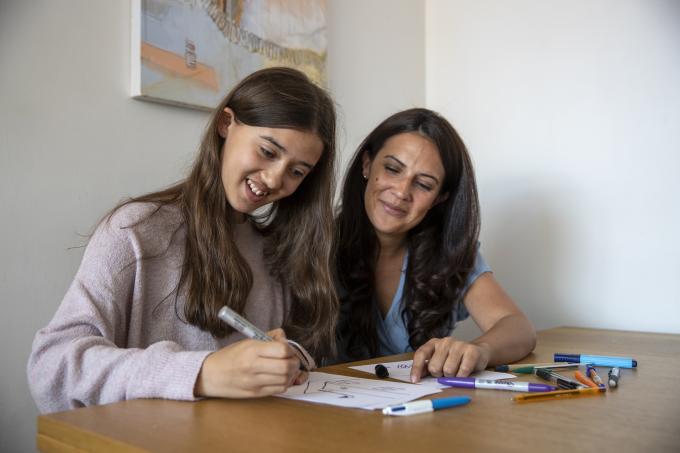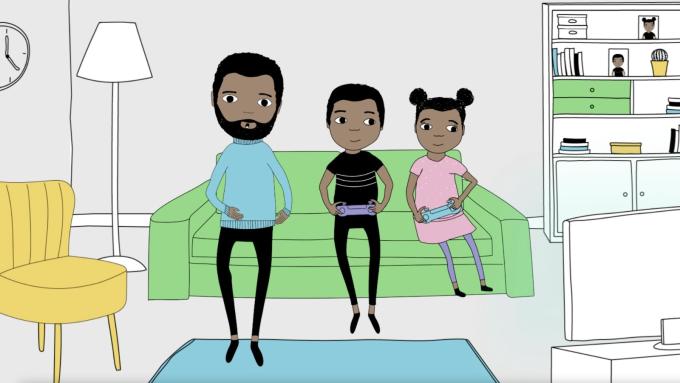Talking to your children can go a long way to helping them feel supported and safe. Read five tips from our experts to help prepare you for any conversation.
Having positive conversations with your children to discuss worries or concerns or even just checking in with them about their life and their feelings is very important to helping them to feel supported and keeping them safe.
Here are some tips from our experts who work with children and young people to help you get talking.
1. Be interested in their lives
Children who know that there is nothing too big or too small that they can talk to you about are much more likely to speak up when things feel wrong or unsafe. Children and young people, need to trust and feel supported by the adults around them.
You can help build this by showing regular interest in their day, asking them about their lives and what’s happening in it, so they know that you care. Celebrate their successes and offer support when things are not going so well.
This can help your children to know that they can speak to you, or another adult they trust, about any worries that they may have. This can also help you to notice any changes in behaviour that could suggest something is happening in their lives that needs attention.
2. Try to make talking about feelings and safety normal
Try to talk about feelings as a regular part of your family life. There are simple ways to help you and your child talk about feelings on a day-to-day basis. For instance, you can try making it part of your routine to check in with how your child is feeling at the start and end of the day. Talking to your child about how your day has been, what kind of things make you feel happy or sad or frustrated can also help your child understand their own feelings and what might affect them.
The young people we support often tell us that they wish they had more chances to have safe, informal conversations about harms to help them feel less uncomfortable and more confident about reaching out for help from adults.
Suzanne
Expert at Barnardo's
You could speak to them, in an age-appropriate way, about what it means to feel safe and what to do if they feel unsafe or uncomfortable about someone else's behaviour. Understanding what it means to feel safe will help children, especially younger ones, to be able to identify when they don’t feel safe and what to do about it.
Make sure they know how to contact you in an emergency and who else they could contact. Talk to them about how they can support their friends and what support they should expect from their friends, too.
It’s important to talk to them about their apps and games on their devices and exploring the safety features together. Read our guide to online life for more information.
3. Be open about your concerns
You might have noticed something that could be a sign of something serious happening to your child, or you might just have a feeling that something isn’t right. You know your child best. If you feel like something is wrong, talk to your child about it. Try to be up front about your worries, and discuss the things you’ve noticed or are concerned about, whilst making sure your child feels safe enough to talk.
Be aware that your child may already be feeling embarrassed or ashamed, so try to discuss your worries without judgement and reassure them that you’re always there to talk to. Spend a bit of time planning where and when to have this conversation. Consider how you and your child might be feeling and ensure you have enough time to talk and that your child is in a place they feel safe.
4. Take a breath before reacting
If your child tells you about something that worries or angers you, try to remain calm. Let them talk at their own pace and try not to interrupt. Your first instinct might be to react to the information you have been given by taking away phones, stopping them from seeing certain friends or grounding them. While understandably this comes from a desire to keep them safe, your child might see this as a punishment for speaking openly or think that what’s happened to them is their fault. This can result in anger and mistrust, or shame, and prevent the child from voicing concerns to you in the future.
We understand that when you hear something is happening to your child, your first reaction might be anger, but this could make your child think that they’ve done something wrong. It’s never a child’s fault, and we need to make sure they know that.
Suzanne
Expert at Barnardo's
5. Reach out to others
If you’re worried, know that you aren’t alone. Talk to other adults that your child has a good relationship with - perhaps a teacher, a family member, a youth worker or friend - and express your concerns to see if there’s anything that they might be able to do to support you.
If your child does talk about an abusive, harmful or dangerous experience, remember that you can access help. The police and social care have specialist officers who can help children and families and can help to make children safe.

Supporting your child's mental health
Get help with supporting children and young people's mental health, with tips and information about anxiety, depression and general wellbeing.

Keeping children safe online
Read tips and advice from our experts on how to talk to your child about the internet and online safety, to help ensure they are keeping safe online.

Supporting keeping children safe from harm and abuse
Explore information about online safety, domestic abuse, child sexual abuse and exploitation, female genital mutilation (FGM), alcohol and substance abuse and child trafficking.

